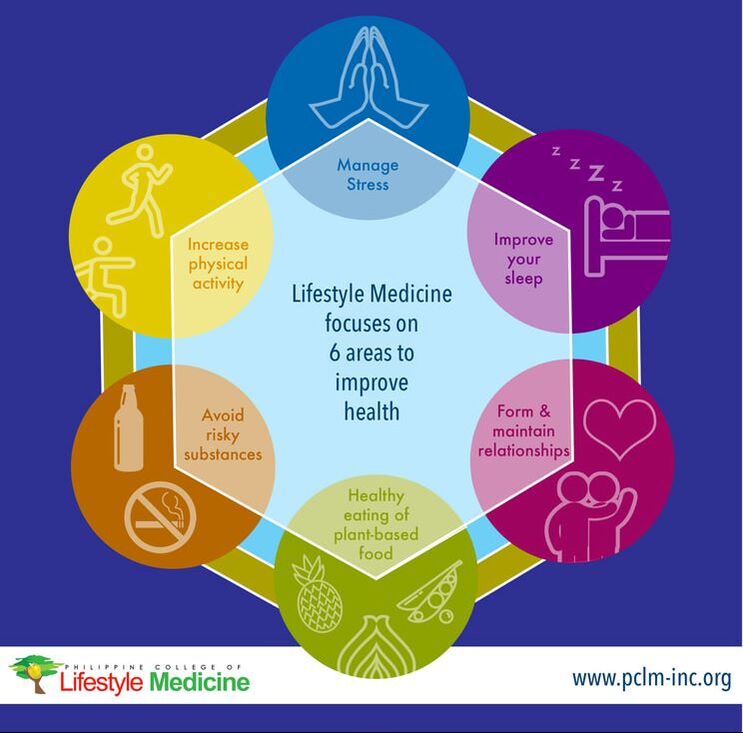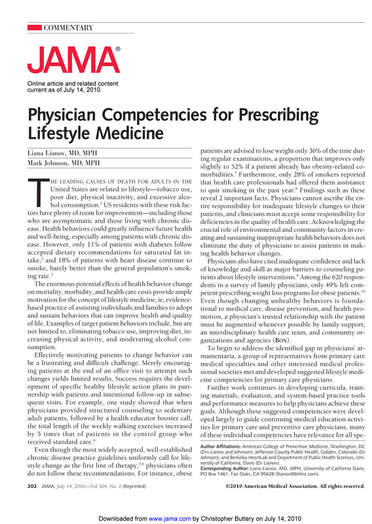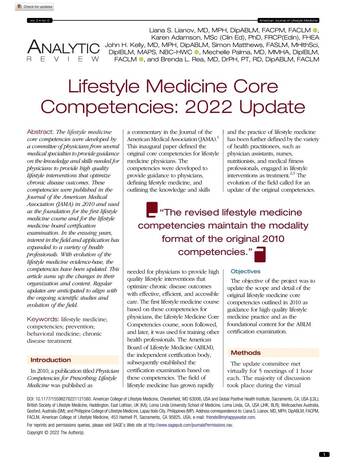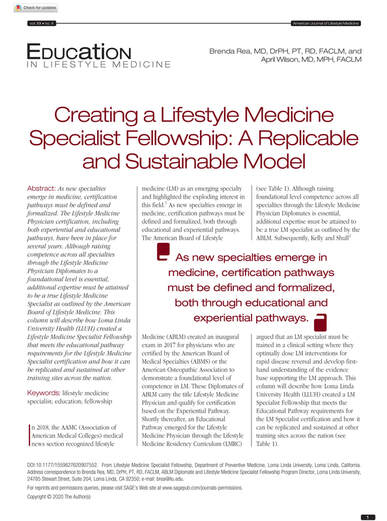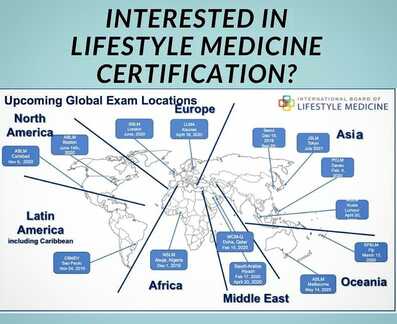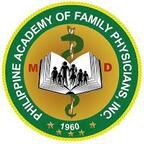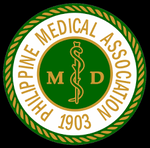GLOBAL LIFESTYLE MEDICINE WEEK CELEBRATION |
|
May 29 through June 04, 2023 is the Global celebration of healthy behaviors and a public awareness campaign on the impact our choices can have on chronic disease.
LIFESTYLE MEDICINE is the use of whole-food, plant-based diet, regular physical activity, restorative sleep, stress management, avoidance of risky substances, and positive social connection as primary therapy for the treatment and reversal of chronic disease. This week focuses on public awareness on the six essential lifestyle elements that optimizes health - nutrition, exercise, sleep, stress, substance abuse, and social connection. |
In celebrating this week, we empower all people to ask their health professional:
- to be educated about Lifestyle Medicine as an evidence-based, growing field of medicine,
- to treat with lifestyle intervention first, and
- to spread health by living by example.
THE GLOBAL LIFESTYLE MEDICINE MOVEMENT |
|
The Lifestyle Medicine Global Alliance (LMGA) represents the convergence of national Lifestyle Medicine professional associations from around the world, uniting under one banner for the purpose of collaboration, shared knowledge and best practices, and to more compellingly convey the power of the lifestyle
|
medicine story—a story of health, hope and healing for one and all. Lifestyle Medicine leaders of all nations are working together to decrease the global pandemic of non-communicable disease.
Why is Lifestyle Medicine Essential to Sustainable Health and Healthcare?
The rise in chronic disease trends and related healthcare spending in the United State and in many other countries around the world is unsustainable. Type 2 diabetes alone is a looming global pandemic with incalculable consequences. 80% or more of all healthcare spending in the U.S. is tied to the treatment of conditions rooted in poor lifestyle choices, with similar statistics in many countries around the world. : Chronic diseases—also known as non-communicable diseases—are among the most common, costly and preventable of all health conditions.
The rise in chronic disease trends and related healthcare spending in the United State and in many other countries around the world is unsustainable. Type 2 diabetes alone is a looming global pandemic with incalculable consequences. 80% or more of all healthcare spending in the U.S. is tied to the treatment of conditions rooted in poor lifestyle choices, with similar statistics in many countries around the world. : Chronic diseases—also known as non-communicable diseases—are among the most common, costly and preventable of all health conditions.
PRIMARY CARE LIFESTYLE MEDICINE COMPETENCY |
|
The July 14, 2010 issue of JAMA carried the result of a two-year project initiated by the American College of Lifestyle Medicine (ACLM) to begin establishing standards in what was then the newly defined field of Lifestyle Medicine. The American College of Preventive Medicine (ACPM) led the organization and management of the project. The Lifestyle Medicine Core Competencies were updated and was published on August 31, 2022.
The publication, entitled Physician Competencies for Prescribing Lifestyle Medicine outlined recommended competencies for all physicians in addressing the lifestyle causes and treatments for most medical problems in modern society. The updated Competencies are outlined to provide a minimum guideline for all physicians, allied health professionals, and health coaches. |
The Blue Ribbon Panel Established Recommended Competencies composed of top level representatives from the American Medical Association (AMA), the American Osteopathic Association (AOA), the American Academy of Family Physicians (AAFP), the American College of Physicians (ACP), the American Academy of Pediatrics (AAP), ACPM, ACLM, and individual national experts in nutrition, exercise.
The Lifestyle Medicine Competencies update was also a two-year project of the review panel organized by the American College of Lifestyle Medicine in 2020. The review panel is composed of experts in lifestyle medicine education convened to update the competencies that included the collaborative members of a lifestyle medicine team. The Philippine College of Lifestyle Medicine President, Dr. Mechelle Acero Palma is one of the members of the panel, who is also involved in the current updating of the Lifestyle Medicine Intensivist Curriculum for the American College of Lifestyle Medicine and the Global Lifestyle Medicine Alliance.
The Lifestyle Medicine Competencies update was also a two-year project of the review panel organized by the American College of Lifestyle Medicine in 2020. The review panel is composed of experts in lifestyle medicine education convened to update the competencies that included the collaborative members of a lifestyle medicine team. The Philippine College of Lifestyle Medicine President, Dr. Mechelle Acero Palma is one of the members of the panel, who is also involved in the current updating of the Lifestyle Medicine Intensivist Curriculum for the American College of Lifestyle Medicine and the Global Lifestyle Medicine Alliance.
|
Lifestyle Medicine Core Competencies: 2022 Update
The new panel used a similar process for updating the competencies by involving the initial organizations and additional ones representing a broad group of health care and medical specialty representatives and international representatives from the Lifestyle Medicine Global Alliance, including the current PCLM president, Dr. Mechelle Acero Palma. This approach helped further increase wide acceptance of the key elements of lifestyle medicine as essential to health care in general, promote the field and garner champions for expanding it across health care settings. A review of the literature and significant prep work by the new identified panelists was conducted which prepared a productive meeting during the revision process. The meeting was followed by more rounds of editing to complete a final revised set of competencies, and process took more than 12 months. |
An international panel was assembled from among the lifestyle medicine community leaders in the conduct of review process. The review identified any new significant evidence and subtopic areas that need to be added, as well as subtopic areas that are significantly out of date. The overall structure, content and approach of the core and expanded competencies remain the same. Detailed review to address the latter along with a complete literature review was conducted by an expanded panel which included the panelists, members of the organizations that participated in the original 2009 blue ribbon panel and representatives from a variety of other medical specialties who are emphasizing lifestyle medicine. Acknowledging that the initial competency development had a U.S focus, the detailed review panel was also tasked with considering whether and how the competencies should be customized to account for cultural and other differences in countries outside of the US.
Leadership
- Promote healthy behaviors as foundational to medical care, disease prevention, and health promotion.
- Seek to practice healthy behaviors and create school, work, and home environments that support healthy behaviors.
- Demonstrate knowledge of the evidence that specific lifestyle changes can have a positive effect on patients’ health outcomes.
- Describe ways that physician engagement with patients and families can have a positive effect on patients’ health behaviors.
- Assess the social, psychological, and biological predispositions of patients’ behaviors and the resulting health outcomes.
- Assess patient and family readiness, willingness, and ability to make health behavior changes.
- Perform a history and physical examination specific to lifestyle-related health status, including lifestyle "vital signs" such as tobacco use, alcohol consumption, diet, physical activity, body mass index, stress level, sleep, and emotional well-being. Based on this assessment, obtain and interpret appropriate tests to screen, diagnose, and monitor lifestyle-related diseases.
- Use nationally recognized practice guidelines (such as those for hypertension and smoking cessation) to assist patients in self-managing their health behaviors and lifestyles.
- Establish effective relationships with patients and their families to effect and sustain behavioral change using evidence-based counseling methods and tools and follow-up.
- Collaborate with patients and their families to develop evidence-based, achievable, specific, written action plans such as lifestyle prescriptions.
- Help patients manage and sustain healthy lifestyle practices, and refer patients to other health care professionals as needed for lifestyle-related conditions.
- Have the ability to practice as an interdisciplinary team of health care professionals and support a team approach.
- Develop and apply office systems and practices to support lifestyle medical care including decision support technology.
- Measure processes and outcomes to improve quality of lifestyle interventions in individuals and groups of patients.
- Use appropriate community referral resources that support the implementation of healthy lifestyles.
LIFESTYLE MEDICINE SPECIALIST COMPETENCY |
|
The Lifestyle Medicine Physician certification has been in place for several years. Although raising competence across all specialties through the Lifestyle Medicine Physician Diplomates to a foundational level is essential, additional expertise must be attained to be a true Lifestyle Medicine Specialist.
ACLM’s Expert Lifestyle Medicine Panel (ELMP) proposes a set of competencies for providers who specialize in the practice of lifestyle medicine (LM), focused on intensive therapeutic lifestyle change |
LIFESTYLE MEDICINE BOARD EXAMINATION |
|
The International Board of Lifestyle Medicine (IBLM) sets and maintains standards for assessment and credentialing of physicians and PhD/Masters level health professionals in Lifestyle Medicine globally. Certification as an IBLM diplomate signifies specialized knowledge in the practice of lifestyle medicine and distinguishes a health professional as having achieved competency in lifestyle medicine. The IBLM certification is co-issued with recognized continental and country lifestyle medicine associations and societies.
|
We are committed to a) high benchmarks that gender irrefutable respect from other scientifically based organisations; b) global standards that are acceptable across international laws and cultures; c) models that are financially viable in the short and long term and d) innovating aggressively so that lifestyle medicine can meet its promise of being a very real part of the solution to the massive NCD epidemic that is overwhelming our planet.
